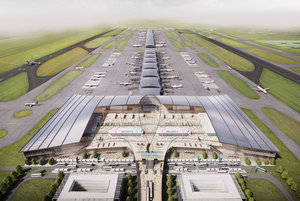Second runway at Gatwick Airport would generate 28,000 jobs

A report conducted by engineering firm Arup has revealed that the construction and operation of a second runway at London Gatwick Airport would generate up to 28,000 additional jobs.
The research by Arup examined the current range of jobs at London Gatwick in the UK and assessed the types of jobs and skills needed for the airport to grow, both as part of its current investment plans and if the government approved a second runway. As well as directly supporting 28,000 new jobs, the report estimated that expansion would stimulate 120,000 jobs across the UK.
The report says that London Gatwick already supports at least 21,000 jobs directly and a further 10,000 jobs indirectly, and that the airport acts as a catalyst boosting wages across the local economy.
Almost half (48%) of the airport’s staff are currently employed by airlines or their handling agents, with the largest single proportion working as air cabin crew (21%). Most Gatwick employees currently work full time, and the majority (84%) work shifts.
Following on from the announcement, the airport has announced a new partnership with three leading universities to establish an engineering graduate program. The partnership with the University of Brighton, University College London and Imperial College London will see three engineering graduates join Gatwick’s engineering team each year. This complements Gatwick’s well-established engineering apprenticeship program, which celebrates its 40th anniversary next year.
London Gatwick has also pledged to stimulate future opportunities if it expands, by establishing a £3.75m (US$5m) apprenticeship fund to create 2,500 new job opportunities for young people. Grants of £1,500 (US$2,000) will be provided to cover the start-up costs of each new apprenticeship.
Stewart Wingate, CEO, London Gatwick Airport, said, “Gatwick’s second runway will not only connect the UK to existing and emerging markets around the world, it will also provide thousands of jobs across the South East and deliver a once-in-a-generation opportunity for young people to directly benefit from expansion.
“This is an example of how Gatwick expansion is a nationally-significant project and can provide a positive boost to the local area, to the region, and to the UK as a whole.
“Gatwick can deliver a new runway faster and have a spade in the ground before 2020 which means, after decades of delay, Britain can finally benefit from airport expansion.”
